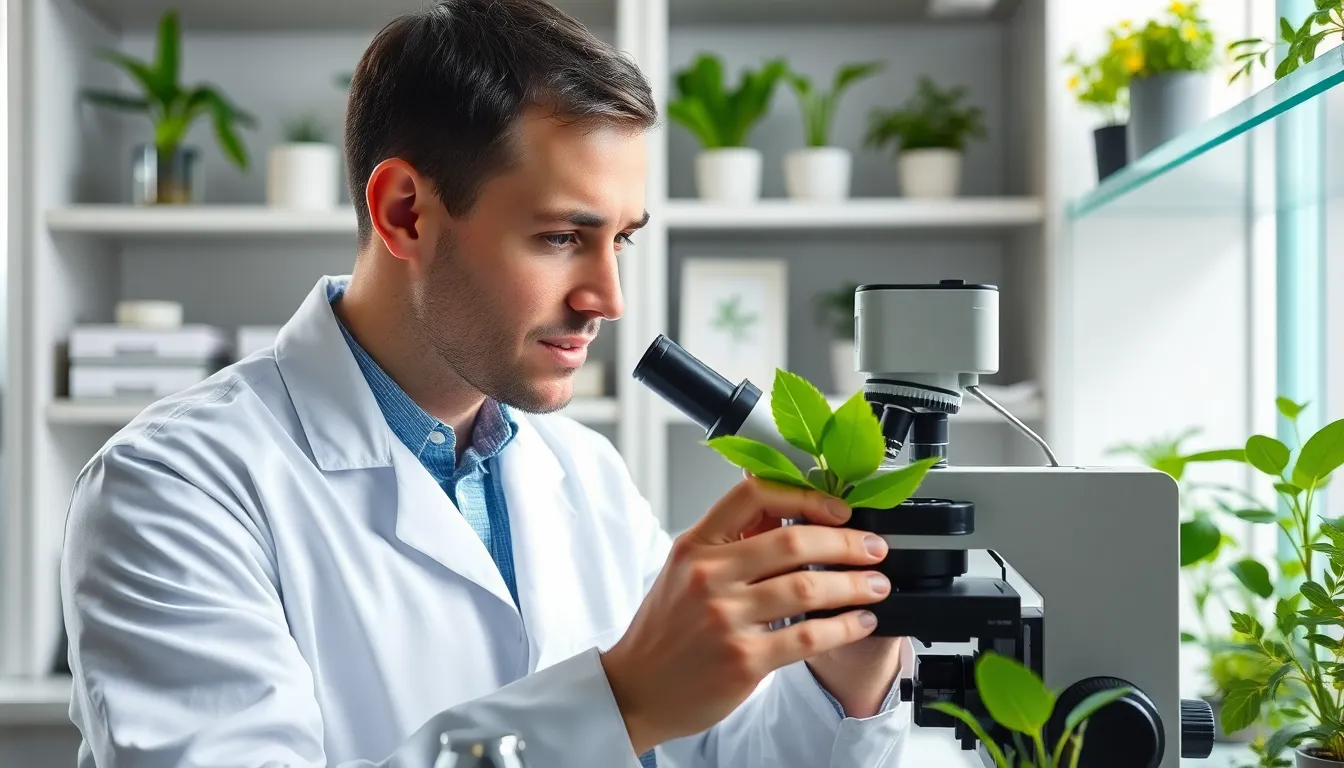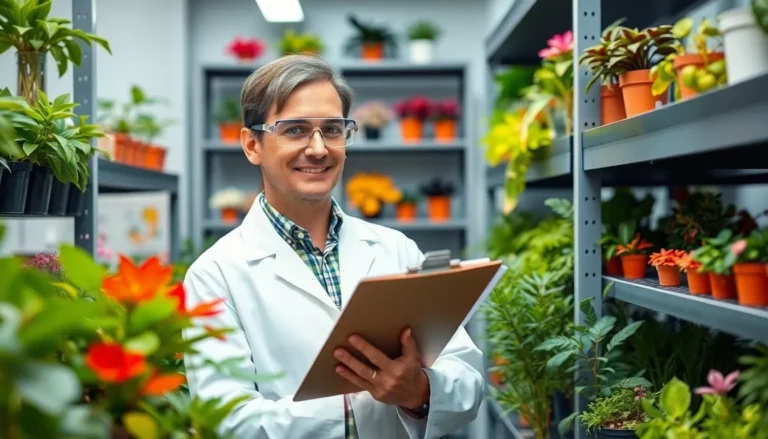In a world where plants are quietly plotting their takeover, staying updated on plant science news is more important than ever. From the latest breakthroughs in genetic modification to the wild adventures of plant-based innovations, it’s a jungle out there, and you don’t want to be left behind. After all, who wouldn’t want to know if their houseplants are secretly communicating with each other?
Plant Science News
Staying updated with plant science news reveals vital developments in the field. These advancements shape the future of agriculture and environmental sustainability.
Breakthrough Research Discoveries
Researchers uncovered new insights into plant signaling mechanisms. Understanding how plants communicate among themselves enhances knowledge of ecosystem functions. Studies indicate that some species use chemical signals to warn neighbors of pests, prompting defensive adaptations. Advances in genomics enable scientists to map these signaling pathways more efficiently. Implementing CRISPR technology in research allows researchers to create precise gene edits, improving crop resilience against climate stress. Recent findings underscore that biodiversity impacts plant health and productivity directly. As scientists publish their results, these breakthroughs pave the way for sustainable agricultural practices.
Novel Plant Breeding Techniques
Innovative plant breeding techniques are transforming agriculture. Gene editing tools like CRISPR simplify customizing traits in crops for enhanced quality and yield. Traditional breeding methods often require several generations to achieve desired characteristics. However, modern techniques facilitate speedy development of disease-resistant varieties. Researchers report successful applications of speed breeding, which significantly accelerates the growth cycle of plants in controlled environments. Utilizing tissue culture methods also allows for rapid propagation of superior plant varieties. Novel approaches like these support food security and help farmers adapt to changing environmental conditions.
Environmental Impact on Plant Science

Environmental factors significantly influence plant science. Understanding this impact shapes agricultural practices and sustainability efforts.
Climate Change Effects on Plant Growth
Climate change alters growth patterns, affecting plant health and productivity. Rising temperatures stress species, leading to reduced yields in key crops. In addition, altered precipitation patterns can cause drought or flooding, further challenging plant survival. Research shows that some species adapt to these conditions through phenotypic plasticity, while others struggle to cope. Data indicate shifts in flowering times and dispersal patterns, affecting pollination and seed distribution. Such changes disrupt ecological balances. Attention must focus on these phenomena, as understanding species responses helps develop climate-resilient varieties.
Sustainability Practices in Agriculture
Sustainable agriculture practices promote environmental health while enhancing crop resilience. Techniques like crop rotation and agroforestry improve soil quality and biodiversity. Additionally, organic farming methods reduce chemical inputs, leading to cleaner ecosystems. Precision agriculture, utilizing technology like GPS, optimizes resource use and minimizes waste. Studies demonstrate that integrated pest management reduces reliance on pesticides, supporting natural predator populations. Implementing these practices not only supports food production but also fosters long-term ecological balance. Ensuring that farmers adopt sustainable techniques requires ongoing education and support.
Technological Innovations in Plant Science
Technological advancements significantly reshape plant science, propelling agriculture into the future. Innovations like biotechnology and artificial intelligence drive these changes forward.
Biotechnology and Genetic Engineering
Biotechnology accelerates crop improvement through precise interventions. Genetic engineering techniques, including CRISPR and gene editing, enhance resistance to environmental stresses and pests. Researchers utilize these methods to develop crops with increased nutritional value and adaptability. Specific advances allow scientists to create genetically modified organisms that benefit food security. Additionally, the Fast-Track Consortium represents a collaborative effort to expedite approvals for beneficial genetic technologies, streamlining the road from lab to field.
Use of AI in Research and Development
Artificial intelligence revolutionizes research and development within plant science. Machine learning algorithms analyze vast datasets, identifying patterns in plant growth and traits. AI applications optimize breeding programs, significantly increasing efficiency. Through predictive analytics, researchers can now forecast crop responses to various environmental scenarios. These innovations empower scientists to make informed decisions, thus enhancing agricultural productivity sustainably. Furthermore, AI tools assist in monitoring crop health in real time, allowing for timely interventions when needed.
Contributions of Plant Science to Food Security
Plant science plays a crucial role in addressing global food security by optimizing crop production and enhancing resilience.
Enhancing Crop Yields
Genetic modification techniques significantly boost crop yields. For instance, researchers incorporate traits that improve drought resistance, enabling plants to thrive under adverse conditions. Utilizing precision agriculture methods also enhances yield predictions based on real-time data. The integration of advanced breeding techniques, such as speed breeding, expedites the development of high-yield crop varieties. Farmers benefit from these innovations as they can plant more productive varieties, effectively maximizing available land.
Resilience Against Pests and Diseases
Plant science focuses on increasing resilience against pests and diseases. Breeding programs target specific genetic traits, enhancing a plant’s natural defenses. Investment in biotechnological applications, such as CRISPR, allows precise editing of genes to bolster resistance. The Fast-Track Consortium supports swift approval of these beneficial technologies. Implementing integrated pest management strategies in agriculture further minimizes crop losses, ensuring that farmers can sustain productivity even in challenging environments.
Conclusion
Staying updated on plant science news is more crucial than ever. With rapid advancements in genetic modification and sustainable practices, the future of agriculture hinges on these developments. The interplay between technology and environmental factors shapes not only crop resilience but also food security worldwide.
As researchers continue to unlock the mysteries of plant communication and adaptability, the importance of informed practices in farming becomes increasingly clear. Embracing innovations like precision agriculture and biotechnology will empower farmers to tackle the challenges posed by climate change.
In this ever-evolving field, a commitment to ongoing education and adaptation is essential for fostering a sustainable agricultural landscape. The journey of plant science is just beginning, and its impact will resonate for generations to come.




